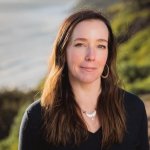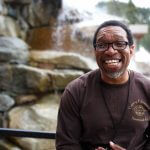Nicole Lampe
Portland, Oregon
This interview was conducted by Carly Schmidt on December 14, 2021. Sign up for The Water Hub’s newsletter to stay up to date on the latest water research, trainings, and campaign success stories here: https://waterhub.org/newsletter/.
Transcript
What does it mean to be managing director of The Water Hub and what are some of your current priorities?
As managing director I get to look across a lot of incredible campaigns to advance both water justice and resilience. The Water Hub launched in January of 2020 to provide an extra set of hands-on communications, including research, media outreach, writing, design, and skill-building in these areas.
In the past year or so, we and our core partners have focused quite a bit on affordability: preventing water shut offs, ensuring water access during the pandemic, and looking at near term debt relief, as well as long term efforts to make sure everyone can pay their water bills. We’ve also been working on elevating water in the federal infrastructure debates, as well as the US and international climate conversation. We’re looking at the ways in which we can change our relationship with water, which is long-term work.
Some of your work focuses on the international climate conversation. What are some topics that you wish were more solidly addressed in these conversations around climate?
First, water. There is a big opportunity to make climate progress through water because it is a much less polarized issue than climate change. We know there is bipartisan support for all sorts of water investments and protections. For instance, we know that we can save energy and reduce emissions by using water more wisely. There is also a real need to shore up water systems so they can keep delivering essential water and sanitation services. Especially recently, in areas affected by extreme weather, water can be a kind of on-ramp into climate action. This opportunity is often underutilized because water and climate groups are a little bit siloed. Even organizations that work on both water and climate tend to have separate programs.
Being housed at Climate Nexus, part of our goal is to bridge the gap by elevating climate provisions in IPCC reports , sharing talking points, and releasing research that connects the dots between climate and water. We’re always trying to leverage the support and broad public concern for water to advocate for climate progress.
Reading about your priorities, I got stuck on this concept of co-creating narrative change. I’m curious what that means and how you are approaching this widespread shift?
Co-creating narrative change is a big, audacious goal. We look to a lot of really smart folks at organizations like the Narrative Initiative and Frameworks Institute for ideas on how to shift the culture and discourse around our issues.
First, we track public understanding of water issues through polling and media analysis, which gives us a shared understanding of top concerns. What language is resonating? What words are journalists using and how are they different from the words advocates are using? How can we make this language more accessible and meaningful to people outside of the water space? How can we educate people about terms that are really important but poorly understood?
Second, we use that research to produce creative content and generate press. A recent example is our Water at Work campaign: a digital and creative effort to make a jobs case for water. This campaign used real stories of projects and jobs in order to put a human face on the opportunity to rebuild our economy by investing in water.
Another example of a narrative change campaign is a big partnership around water affordability. There is a persistent myth that debt is the result of personal choice. For instance, when we’re talking about water bill assistance or debt relief, we’re careful to talk about the systemic drivers of water debt like rising water rates, huge differences in rates from one community to the next, rising home prices, healthcare costs, and a recent economic downturn that has resulted in high unemployment. By putting this context front and center, we are able to talk about how the problem can be fixed from a public health and human rights perspective instead of placing blame on the most impacted people.
You are working with such widespread misconceptions about water affordability and where the issue originates. What has your research shown about how perceptions have shifted in the last few years?
The understanding and level of concern about climate change and climate-driven water problems has certainly shifted. Far more people understand that climate change is happening today and far more people have experienced an extreme weather event – like the Western drought, wildfires, or hurricanes in the South – and they are less likely to believe that these events are normal weather variations. The good news is that people understand that climate change is here and support action. Now we need people to support the right solutions.
I also find that people are much more excited about water conservation and efficiency than they are about new dams and diversions. Similarly, today people are generally more supportive of water bill assistance and addressing plumbing gaps in rural communities. Although there are certainly partisan and geographic differences, water solutions tend to poll very well. The need is less about changing public opinion and more about framing our proposed policies and funding measures in a way that connects to things people care about. We often describe solutions by getting deep into the weeds of the process. At The Water Hub, we try to frame solutions in a way that connects to and resonates with what people already care about.
As 2021 comes to a close, I want to ask about your proudest moment of this last year and why this moment was so meaningful to your work.
The proudest moment for me, every year, is when groups on the ground invite us into their campaigns. The Water Hub is a service organization and we’re just here to help groups on the front lines of water, justice, and resilience efforts. It’s very humbling and is truly a privilege to get to contribute to things that we care about that are good for our friends and neighbors. We’re just so grateful that we are able to lend a hand.
Read Nicole’s reflections on 2021.
What has kept you motivated this last year?
What keeps me motivated is feeling like we’ve made real progress. Water has been top of mind for federal and state leaders and voters in a way that I’ve never seen before, partly because of challenges being made more urgent by climate change but also because of decades of work building awareness and power. I feel very lucky to be working on water right now because there’s potential for transformative change.
Sign up for the Water Hub newsletter to stay up to date on the latest water research, trainings, and campaign success stories here: https://waterhub.org/newsletter/.
About
Nicole has worked in cause communications for over fifteen years. For most of that time, she has focused on protecting environmental and public health. As public affairs manager at The Trust for Public Land, Nicole worked to expand outdoor access for communities across the Western United States. She continued working on park and beach access at Resource Media, a nonprofit PR firm where Nicole had the opportunity to support a range of nonprofit and foundation clients. During her 11 years there, Nicole built the organization’s first digital team. She also led its oceans and freshwater programs, managing projects that took her from the Sacramento Delta to the Delaware River Basin, and Corsica to the Galapagos Islands. Nicole also supported Resource Media’s multi-year equity journey, learning a tremendous amount that informs her work to this day. Today, Nicole is managing director of The Water Hub, a project of Climate Nexus.
Born and raised in Merced, California, Nicole spent her summers exploring Lake Yosemite, an irrigation reservoir that serves the area’s many farms. As a teenager, she raised sheep for 4H. Her family ties to the Central Valley are a big motivator in Nicole’s work to advance water justice and resilience. Nicole sits on the boards of The Civil Conversations Project and Whales of Guerrero Research Project. She studied history at the University of California, Berkeley.







